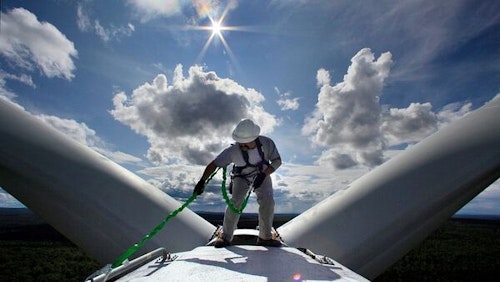We're heading into the final hours at the UN climate conference with COP28 President Sultan Al Jaber pushing to finish on time. But can a final deal be agreed that works for everyone?
Welcome to our live coverage of COP28. Keep up to date with the latest news from Dubai from the UN climate conference.
 ADVERTISEMENT
ADVERTISEMENT
 ADVERTISEMENT
ADVERTISEMENT

 ${title}
${title}
Live ended
It's been a bit of a whirlwind over the last few hours since the release of the draft text by the presidency. We're signing off now for the evening as negotiators, delegations heads and the COP28 presidency head into closed-door meetings to no doubt hammer out the details.
Before we go a quick summary of what happened today:
- COP28 presidency released a long-anticipated draft text that doesn't include the phrase 'phase out' fossil fuels - much to the disappointment of various countries and campaigners.
- EU Climate Commissioner Wopke Hoekstra said that as it stands now, it is "disappointing" and "not adequate to address the problem we are here to tackle".
- Many NGOs, campaigners and civil society groups have also said that it is inadequate.
- Small Island States are concerned that their voices aren't being heard in talks, claiming "several other Parties have enjoyed preferential treatment, compromising the transparency and inclusivity of the process".
- Brazil was formally chosen as the host of COP30 and Azerbaijan was also confirmed as the host of COP29 next year.
The UN climate conference is due to finish tomorrow but we're under no illusion that a final agreement is likely before the scheduled end. So we'll be here bright and early tomorrow to see where we stand. See you then!
"The text as it now stands is disappointing. It is insufficient and not adequate to address the problem we are here to tackle.
The science is clear: we need to phase out fossil fuels.
We have to continue the conversation." #COP28 pic.twitter.com/ZakJwDg9yd
— Wopke Hoekstra (@WBHoekstra) December 11, 2023

View: America is failing Africa by not taking COP28 seriously
Washington's decisions still largely signal the status quo to other nations in the Global North — and if the US is not willing to put its money where its mouth is when it comes to climate finance, then it’s very possible other wealthy nations could follow suit, Abdoulie Ceesay writes.Germany's Foreign Minister Annalena Baerbock has also said that the text is clearly insufficient and disappointing.
Speaking at the country's Pavilion in Dubai, she said Germany could not sign a deal that doesn't include replacing fossil fuels.
COP28 draft text is 'disappointing', says EU
EU climate commissioner Wopke Hoekstra has said that the "text as it now stands is disappointing" and "not adequate to addressing the problem"
He and Spanish environment minister Teresa Ribera who are co-lead of the EU delegation at COP28 have been giving their reaction to reporters.
Ribera said there are elements of the text that are "fully unacceptable" and it is "missing many things" but Hoekstra did concede that there are a few good things in it.
Both acknowledge that this could be the start of a long process, saying the European Union delegation will talk as long as is needed to get the changes it feels are necessary.
An update from the mother of Licypriya Kangujam - the young activist who stormed the stage earlier to call for a fossil fuel phaseout.
We're now at the exit gate of COP28 UAE near the metro stations. It's shocked to see the treatment of the host country against the kids for standing against the green-washing of #COP28. Its not a climate summit. It's a fossil fuel summit.
— Licypriya Kangujam (@LicypriyaK) December 11, 2023
Brazil formally chosen to host COP30
Amid all the uproar and rapid reactions to the draft text, Brazil has been formally chosen to host COP30. This UN climate conference will be held between 10 and 21 November 2025 in the city of Belém - in the Amazon rainforest.
Minister of the Environment and Climate Change and head of the Brazilian delegation, Marina Silva said that "the Amazon will show us the way".
"Holding COP30 in the heart of the forest is a strong reminder of our responsibility to keep the planet within our 1.5°C mission."
The proposal to hold COP29 in Azerbaijan next year has also been approved.
Back to the text itself and following up on a couple of major pledges made early on at COP28.
Despite a huge announcement on tripling nuclear energy by 2050, there is a fleeting mention of nuclear energy in the text. It is included in the accerleration of zero and low emissions technologies but follws yet another use of that phrase inter alia or 'among other things'.
Methane was also a major topic of discussion but it is also only mentioned once in the draft text. It comes under the heading of accelerating and substantially reducing non-CO2 emissions "including, in particular methane emissions" globally by 2030.
Small island states worry their voices aren't being heard
Chair of the Alliance of Small Island States (AOSIS), Minister Cedric Schuster of Samoa has expressed concern over the current process at COP28.
"We are concerned that the process at this time is not in the spirit of multilateralism. As SIDS (small island developing states), we feel our voices are not being heard, while it appears that several other Parties have enjoyed preferential treatment, compromising the transparency and inclusivity of the process."
Schuster said that the group is greatly concerned by how the lack of a platform to air its views has resulted in weak language that "will obliterate our chances of maintaining the 1.5°C warming limit".
AOSIS says it will reject any text that compromises that 1.5°C limit, again referencing the use of the word "could" which seems to be a sticking point for many.
"Paragraph 39 of the GST text draft includes weak language on fossil fuels is completely insufficient," Schuster says.
"It does not refer to a phase out at all. It presents a menu of options that states “COULD” take. Could is unacceptable. States MUST take action on fossil fuel phase out."
BREAKING #COP28: Small Island Developing States @AOSISChair very concerned by the current draft text: “weak langage on fossil fuels”, “completely insufficient”. “It doesn’t refer to a phase out at all.” “Any text that compromises 1.5°C will be rejected.” Minister Cedric Schuster pic.twitter.com/Vj6xqIe6Tm
— Pierre Cannet (@pierrecannet) December 11, 2023
We didn't come here to sign our death warrant - Marshall Islands
Head of the Republic of Marshall Islands delegation, Mr John Silk has said the country won't accept an outcome that leads to devastation.
“The Republic of the Marshall Islands did not come here to sign our death warrant. We came here to fight for 1.5 and for the only way to achieve that: a fossil fuel phase out. What we have seen today is unacceptable. We will not go silently to our watery graves. We will not accept an outcome that will lead to devastation for our country, and for millions if not billions of the most vulnerable people and communities.”
More on the language used in this draft from Simon Evans at Carbon Brief who has been combing through the text.
He's found that very few of the verbs used in the text actually ask for action.
Hardly any of the verbs in the latest draft global stocktake text at #COP28 actually *ask for action*
It's all "notes", "recognises" etc etc, with a few weak "invites"and only a very few slightly stronger "calls on"
(most "requests" go to the secretariat or similar) pic.twitter.com/ap0Ygm3tm1
— Simon Evans (@DrSimEvans) December 11, 2023
Text is 'grossly insufficient' - but there's still time
Chair of The Elders Mary Robinson has given her reaction to the draft text:
"It is not good enough to say you recognise and respect the science but then fail to take heed of its dire warnings in the collective action you commit to.
It is not good enough to note with ‘alarm and serious concern’ the findings of the IPCC Sixth Assessment Report and the damage being caused by climate change but then fail to put in place the steps the science recommends.
It is not good enough to say you reaffirm the Paris Agreement but to then fail to commit to a full fossil fuel phase out. It is not good enough to use weak language or to permit loopholes for the fossil fuel industry to continue to contribute to the very problem countries are meant to be committed to tackling here in Dubai.
Adequate time and opportunity still lie ahead, provided that nations promptly return to the negotiating table, equipped with the resolve required for a crisis of this magnitude and a readiness to undertake the necessary measures. This current version of the COP28 text is grossly insufficient."
Kaisa Kosonen, head of the Greenpeace COP28 delegation, has called the draft text a "dog's dinner".
"If this is all we get from COP28, then this conference was a failure. Acting in line with science doesn't mean you can do whatever you want. Phasing out fossil fuels is not a choice anymore!"
Kosenen also points out how the text provides a "menu of things countries might choose to do or not to accelerate the energy transition".
It's that little word "could" and the use of the phrase "inter alia" in the text which some are saying gives countries a loophole to avoid taking action.
New text a 'paper fan being waved at a burning house' - reactions
A few reactions to the Global Stocktake text's wording on fossil fuels already coming in.
"To put it bluntly, the text related to the energy package that we’ve waited all day to see is extremely disappointing, concerning, and nowhere close to the level of ambition people around the world deserve," says Dr Rachel Cleetus, policy director and a lead economist for the Climate and Energy Program at the Union of Concerned Scientists.
"Invoking science, as so many leaders are doing, comes with a serious responsibility to put forward language that actually reflects it. This draft comes with a huge qualifier of ‘could’ at the top that makes all the listed actions optional for nations. It has a laundry list of actions filled with glaring loopholes, including a lack of meaningful timelines, especially in this critical decade.
"The science is irrefutable and people around the world have a clear demand: the fossil fuel era must be phased out, starting now. The latest GST text is riddled with the evidence of world leaders succumbing to the perverse influence of the fossil fuel industry and petrostates instead of choosing to safeguard a livable future for people and the planet.
"In these final hours, we urge world leaders to deliver the real action we came here to secure."
Teresa Anderson, global climate lead at ActionAid says it is a "giant step backwards".
"The previous COP28 draft text broke new ground in proposing a phase out of fossil fuels. To take it over the finishing line we just needed to agree the finance and fair timelines that would make the package workable for lower-income countries.
"But instead of taking us closer to a fossil-free future, this draft takes a giant step backwards. It’s staggeringly empty of any new commitments. Instead of deciding to take action, it simply ‘recognises the need’ to phase down unabated coal and scale up renewable energy, leaving out any reference to other fossil fuels such as oil and gas. It ‘notes the need for’ finance, but doesn’t actually provide any. It legitimises debunked technologies such as carbon capture and storage.
"It’s a paper fan being waved at a burning house. After all the momentum and hope that has been building here, it’s horrible. It’s devastating."
“The COP28 Presidency has been clear from the beginning about our ambitions," a COP28 spokesperson has said.
"This text reflects those ambitions and is a huge step forward. Now it is in the hands of the Parties, who we trust to do what is best for humanity and the planet.”
Global stocktake text avoids fossil fuel 'phase out' language
The latest draft of the deal the COP28 presidency hopes to reach at the end of the summit has finally dropped.
The text does not directly mention a "phase out" of fossil fuels and the following commitments come under a statement that says parties should "take actions that could include, inter alia" - in other words, to take actions that include these efforts among other things.
Instead of a fossil fuel phaseout, it references "reducing both consumption and production of fossil fuels in a just, orderly and equitable manner so as to achieve net zero, by, before or around 2050 in keeping with the science".
Though it isn't the exact wording some may have been expecting, it achieves roughly the same result and does avoid the use of the word "unabated" which has been seen as a kind of loophole for watering down the text.
Commitments on tripling renewable energy and doubling energy efficiency by 2030 are in there as expected. As is a rather vague statement on "phasing down" unabated coal and "limitations" on new unabated coal power generation.
Renewables and carbon capture and storage tech are referenced to "enhance efforts towards substitution of unabated fossil fuels in energy systems". Language around methane emissions is also pretty vague, proposing "accelerating and substantially reducing non-CO2 emissions" with no clear target included.
The text also includes reference to fossil fuel subsidies but with the caveat of committing to phase out those that are "inefficient".
And we have a text! The long-awaited global stocktake draft from the COP28 presidency is finally here.
Give us some time to read through it and we'll give you a run-down very shortly. Some spoilers: It doesn't directly mention a phase-out of fossil fuels.
12-year-old activist Licypriya Kangujam stormed the stage just after the COP28 presidency finished its speech at a Global Climate Action High Level event. She was clapped and cheered by the crowd as she was escorted off the stage by UN police.
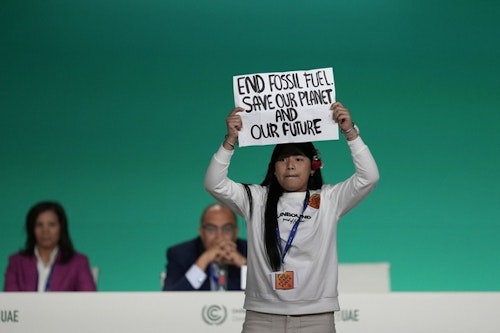
MOST URGENT: Licypriya mother here from #COP28UAE .
Licypriya just disrupted the High Level Session of #COP28 in Al Ghafat Hall by protesting to phase out fossil fuels and UAE Police has taken away her to unknown place. Kindly help me to trace her. 🙏
— Licypriya Kangujam (@LicypriyaK) December 11, 2023
We're awaiting the text of an agreement that could mean a major shift in the global economy. But to make this transition happen, we need far more people with green skills to do the job.
We spoke to the co-founder of LinkedIn Allen Blue about a recent report released by the social media company. Using data from a billion users, they found that a "significant sustainable skills shortage" is putting progress at risk.
"We saw it in the tech world, but it took 15 years to actually overcome that lack of engineers and I’m not sure we’ve even overcome it,” Blue told us. “I don’t think we have 15 years this time around.”
Read more here:
We're here to secure an agreement on phasing out all fossil fuels, Beyond Oil and Gas Alliance says
The Beyond Oil and Gas Alliance (BOGA), an international alliance of governments working together to facilitate the managed phase-out of oil and gas production, has spoken at COP28.
"COP28 should be the COP where parties make ambitious commitments towards phasing out fossil fuels in order to keep 1.5C alive," France's Minister for Energy Transition, Agnes Pannier-Runacher told a press conference.
The coalition has also issued a statement signed by climate and environment ministers from around the world including Denmark, Finland, France, Ireland, Portugal Spain, Sweden and Wales, among others.
"We are here with a clear mandate to secure an agreement to phase out all fossil fuels at COP28," it reads.
"The escalating impacts of climate change and soaring energy prices, particularly on the most vulnerable, are increasingly visible. We cannot fail to address the root cause of these crises – namely, our continued dependence on coal, oil, and gas."
Failing to do so, they say, would be accepting unlimited loss and damage and deepening climate, energy and economic insecurity.
"We urge all Parties to join us in calling for the global phase out of all fossil fuels in line with IPCC pathways – to achieve net zero CO2 no later than 2050 and limit global average temperatures to 1.5°C above pre-industrial levels under the negotiated outcomes of COP28."
BOGA says this must include a peak in fossil fuel production and consumption this decade with a peak in emissions by 2025. Alongside this, renewable energy needs to grow, energy efficiency needs to improve and subsidies for fossil fuels need to end as soon as possible.
Interestingly, the statement highlights that the fossil fuel sector can't unwind itself in isolation, saying we need to plan for an "orderly, just transition" instead of risking the sudden closure of uneconomic oil and gas production.
"Producers and consumers, and the multilateral system, must work together to avoid price volatility, and to support investment in the transition, particularly for the most exposed economies and communities," the statement reads.
"Agreement on the need to phase out all fossil fuels can set us on this path toward true climate, energy, and economic security. We must start planning for and investing in our future. Securing an agreement that addresses the phase out of all fossil fuels at COP28 is the first step toward this.
"We urge all Parties to join us."
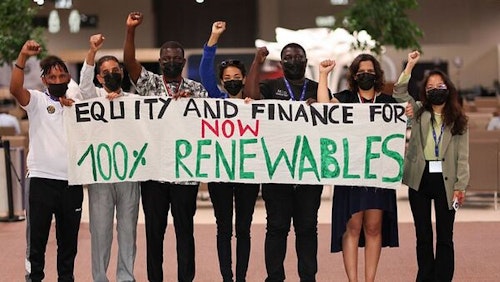
'None of us have had much sleep': Countries urged to phase out fossil fuels on COP28's final days
UN officials and activists say negotiators have no time to lose to agree on how to cap planet-warming emissions and keep the worst of warming at bay.While we're waiting, let's run through what it is that we are actually waiting for anyone who hasn't been following the process.
A draft text from the COP28 presidency is expected at some point today. It will bring together all of the things countries have discussed at this climate conference from major topics like fossil fuels and loss and damage to more technical details like carbon markets that have received a little less coverage.
Once it is published, there will be even more discussion, wrangling with wording and negotiation to reach a point where all countries are willing to unanimously adopt the final text. This requirement for consensus is why we often see much more cautious, ambiguous language in these documents.
There's a lot to go through and a number of sticking points (like a fossil fuel phaseout) still left to get in the way before it becomes an official global climate pact like the Glasgow Pact from COP26 or the Sharm el-Sheikh Implementation Plan from COP27 last year.
It is looking like it will take a herculean effort to conclude before the scheduled end of COP28 at 11 am on Tuesday. And, if history tells us anything, there's a good chance we'll end up in overtime or even looking to COP29 in Azerbaijan next year for some of the more technical parts of the text.
'We're out of road - and almost out of time' - UN chief
UN chief Antonio Guterres has also spoken to reporters this morning after returning to Dubai from the Doha forum in Qatar.
With COP28 scheduled to wrap tomorrow, Guterres said there are "still large gaps that need to be bridged".
He asked negotiators to aim for "maximum ambition" on two fronts: reducing greenhouse gas emissions and delivering climate justice.
The UN chief also said that the next two years are vital, meaning governments must leave Dubai with a "clear understanding" of what is needed between now and COP30 in Brazil.
"So as we approach the finish line for COP28, my main message is clear:
"We must conclude COP28 with an ambitious outcome that demonstrates decisive action and a credible plan to keep 1.5 alive and protect those on the frontlines of the climate crisis," Guterres said.
"We can’t keep kicking the can down the road. We are out of road – and almost out of time."
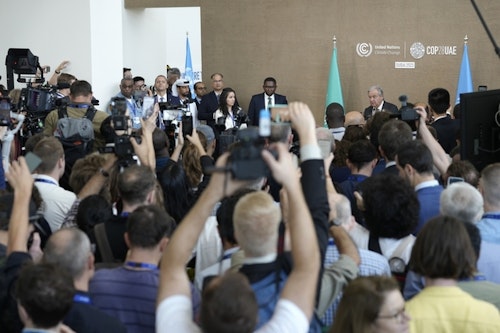
Clear the 'tactical blockades' and 'strategic landmines' says UN climate chief
Head of the UN climate change body, Simon Stiell, has told reporters this morning that the remaining negotiations have "narrowed significantly" with two issues now at the head of the table.
Stiell said these were the level of ambition on mitigation and willingness to back the transition with the proper means to support it. He said the highest level of ambition was possible for both.
"I repeat – the highest levels of ambition are possible on both. But if we reduce on one, we reduce our ability to get either.
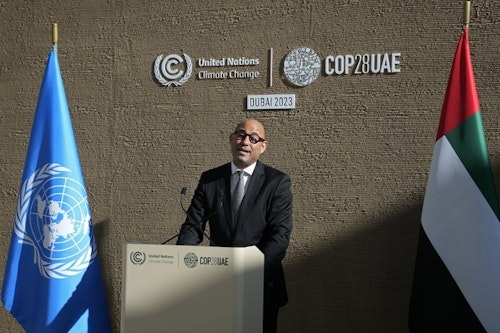
"So that leaves us with the question: how do we get, from here, a meaningful deal?"
Stiell called out "tactical blockades" which were holding up progress and "strategic landmines that blow it up for one, blow it up for all".
The UN climate change chief urged negotiators to reject incrementalism, respect each party's seat at the table and keep the highest ambition front and centre.
"We do not have a moment to lose in this crucial home stretch," Stiell said.
Good morning and welcome to our live coverage of COP28! We'll be bringing you the latest as negotiations in Dubai approach the final stretch.
But first here's an update on what you missed yesterday.
Food day got off to a flying start with the announcement that a “vanguard” of countries, including Brazil and Norway, are grouping together to transform their food and land use systems.
Established under the Paris Agreement in 2015, the global goal on adaptation (GGA) is a framework to help channel money for adaptation - and get it flowing on the same scale as finance for mitigation (which concerns supporting countries to cut emissions). After two years of work, a draft text on the GGA was published yesterday morning - to a mixed reception from campaigners and experts.
The International Energy Agency warned that emissions-cutting pledges made by more than 100 countries and 50 fossil fuel firms at the start of COP28 aren't enough to limit global warming to 1.5°C.
If these pledges are delivered, it would reduce emissions by 4 billion metric tonnes of CO2 equivalents by 2030. That is 30 per cent of what is needed to limit warming to 1.5C above pre-industrial levels.
"They would not be nearly enough to move the world onto a path to reaching international climate targets," the IEA said.
And, as the end of the summit rapidly approaches, COP28 President Sultan Al Jaber said late yesterday that he is urging countries to come to negotiations "prepared with solutions" and "ready to be flexible and accept compromise".
The "time has come for us to switch gears", he said.
Today, we await a draft text from the presidency that brings together all the strands of the conference - from fossil fuels to renewable energy, adaptation and climate finance.
UN chief Antonio Guterres is back in Dubai from Doha and has left leaders with three urgent appeals:
I have come back to #COP28, because we are on the brink of climate disaster & this conference must mark a turning point.
I am here to renew my urgent appeal to leaders:
Recommit to the 1.5°C warming limit.
End the fossil fuel age.
Deliver climate justice.
Make #COP28 count.
— António Guterres (@antonioguterres) December 10, 2023











